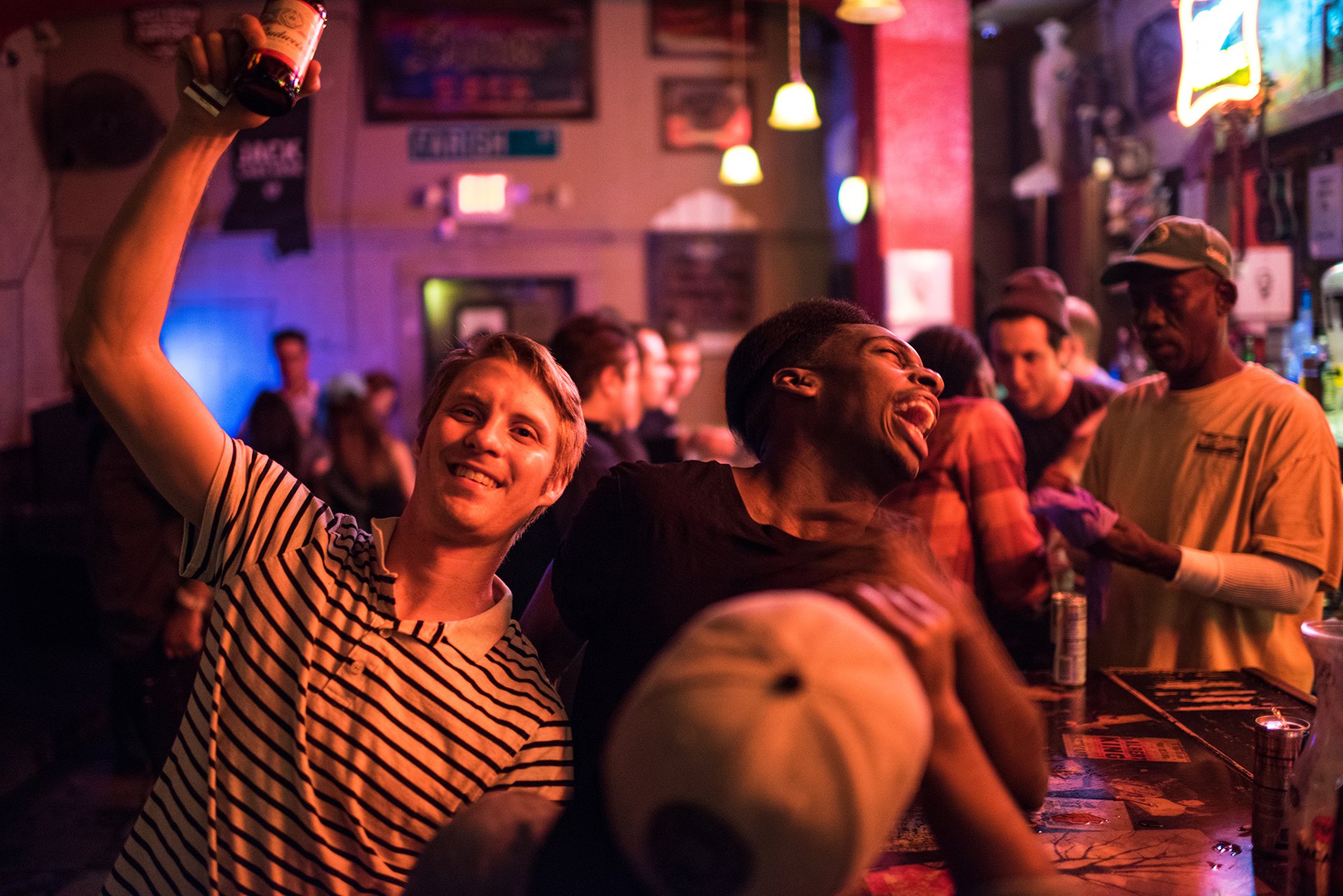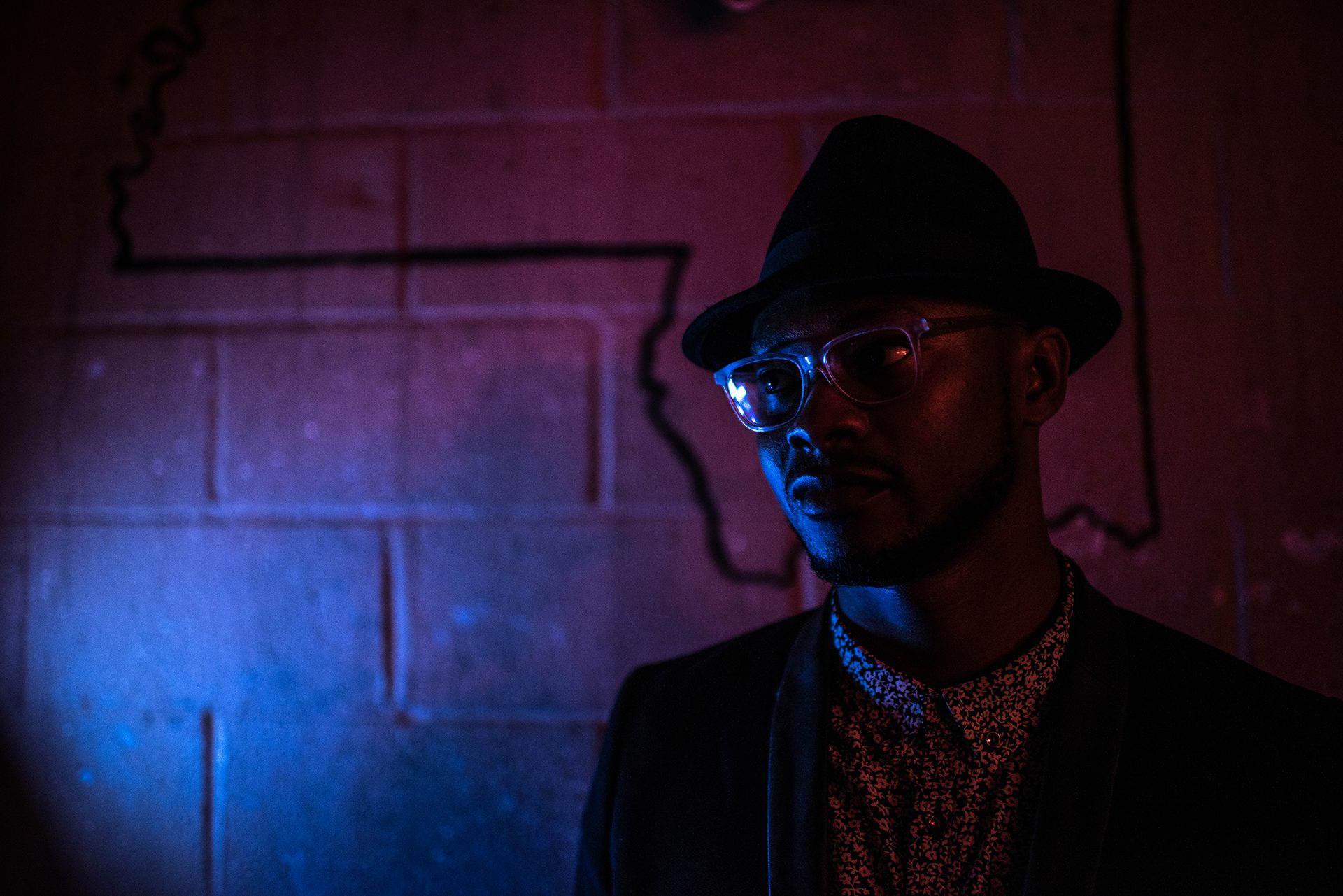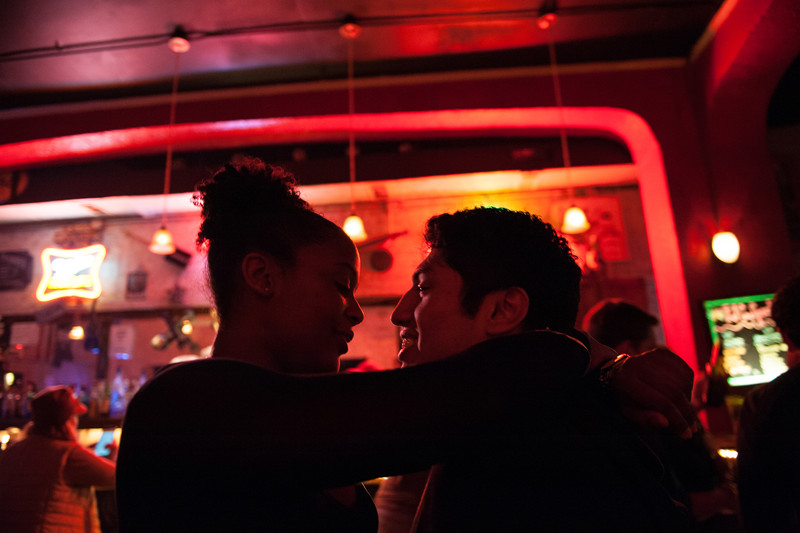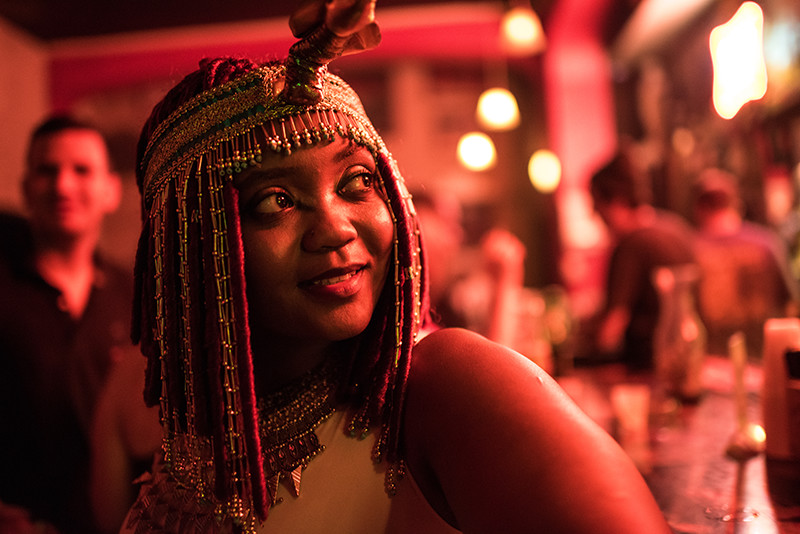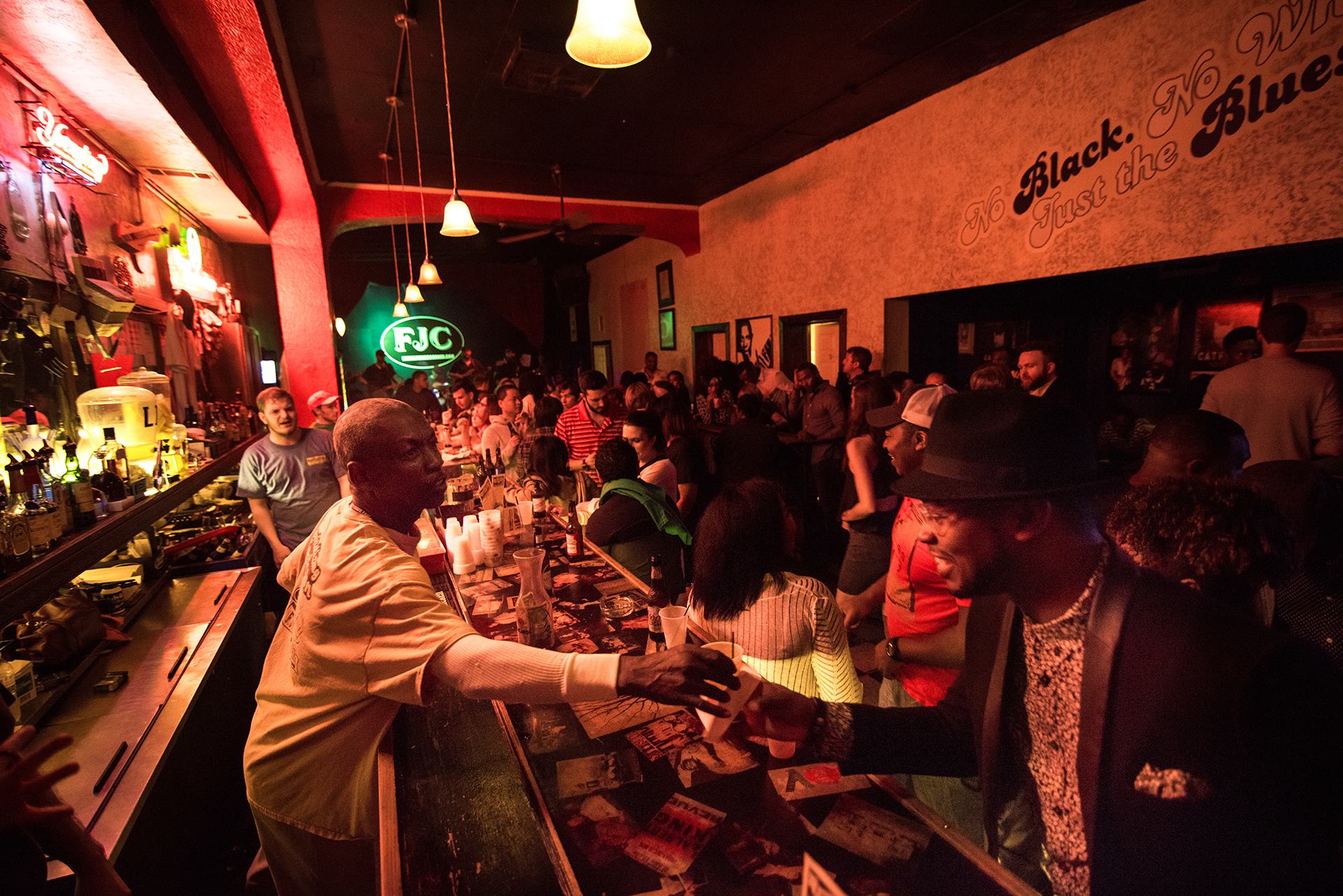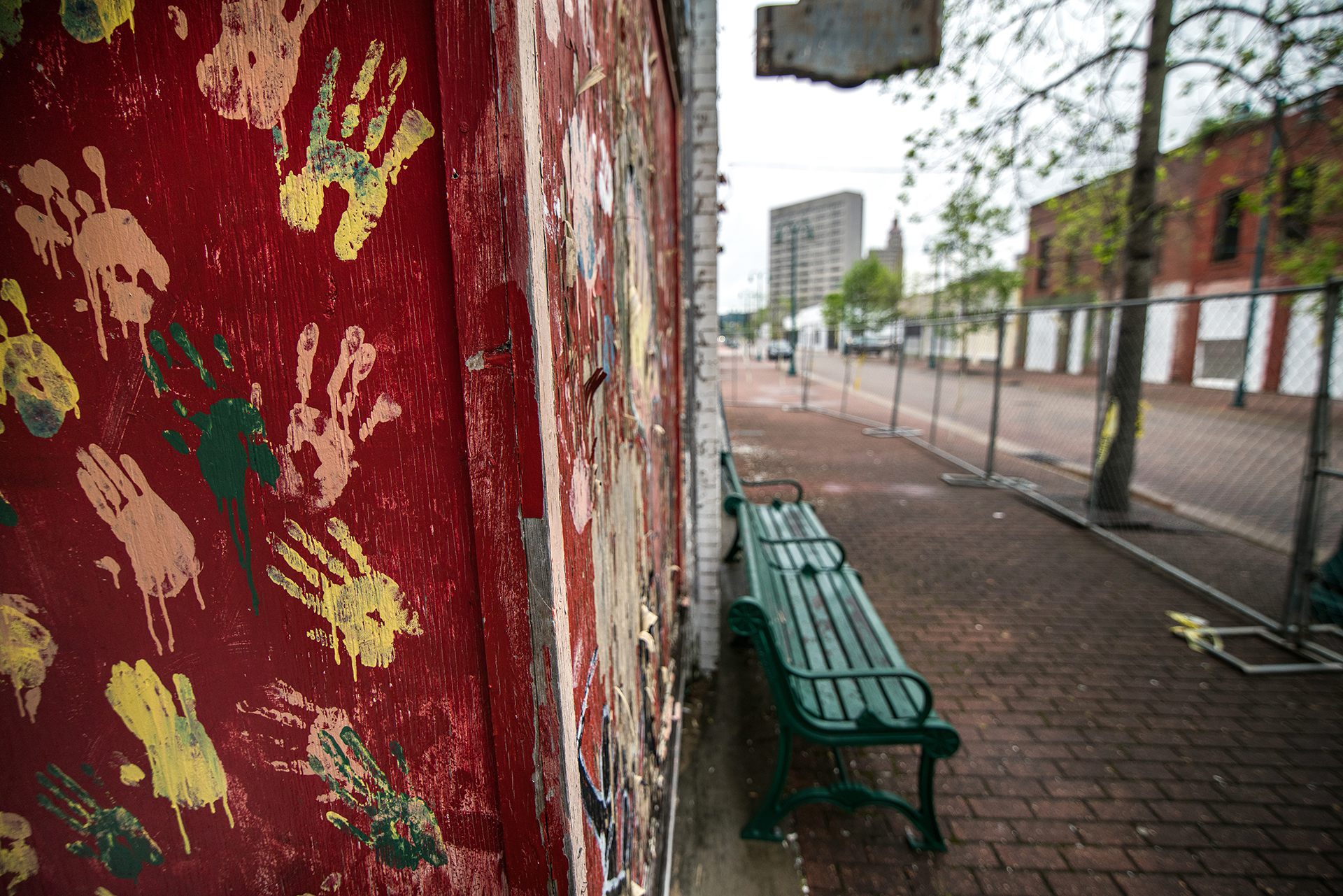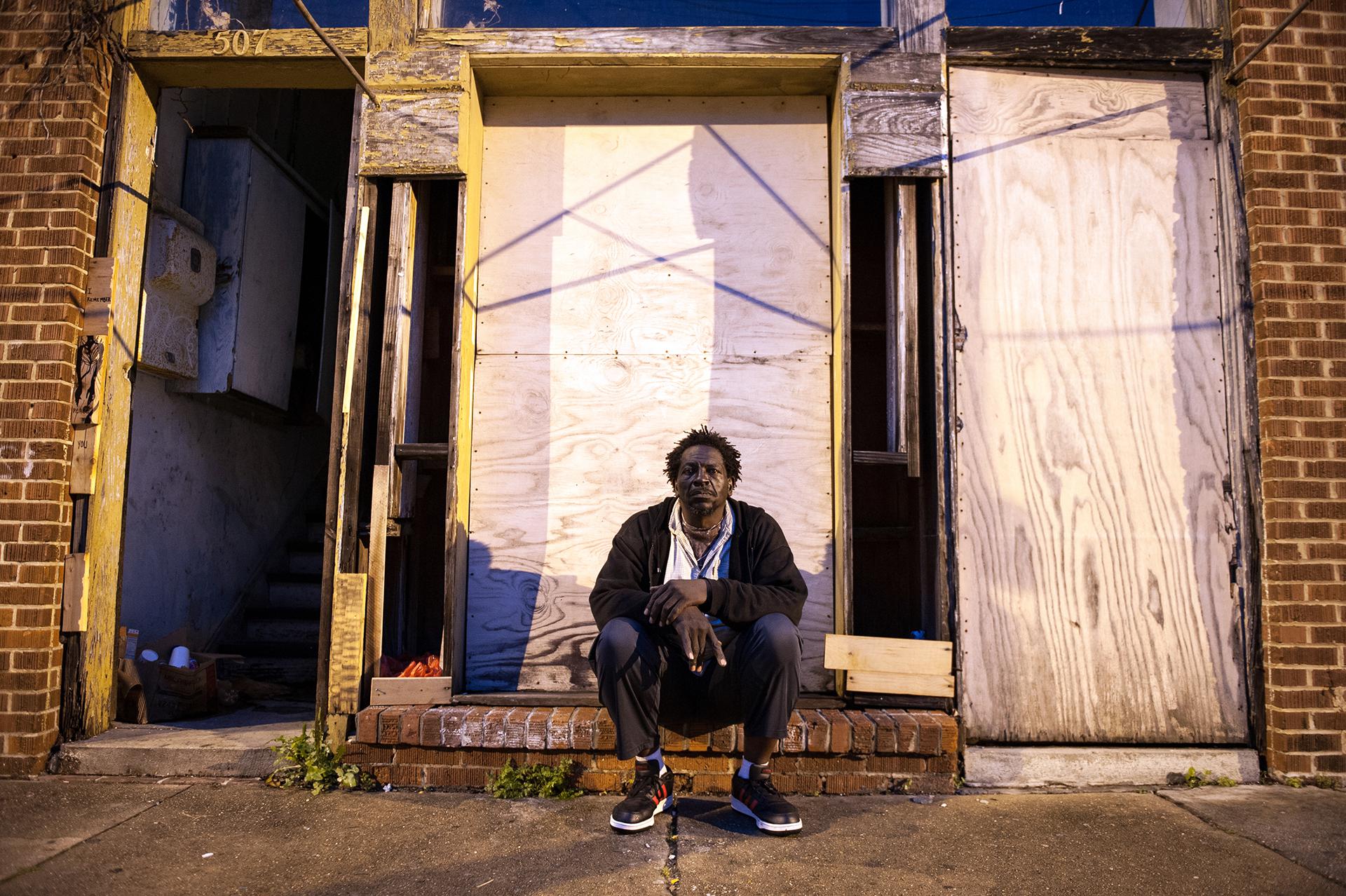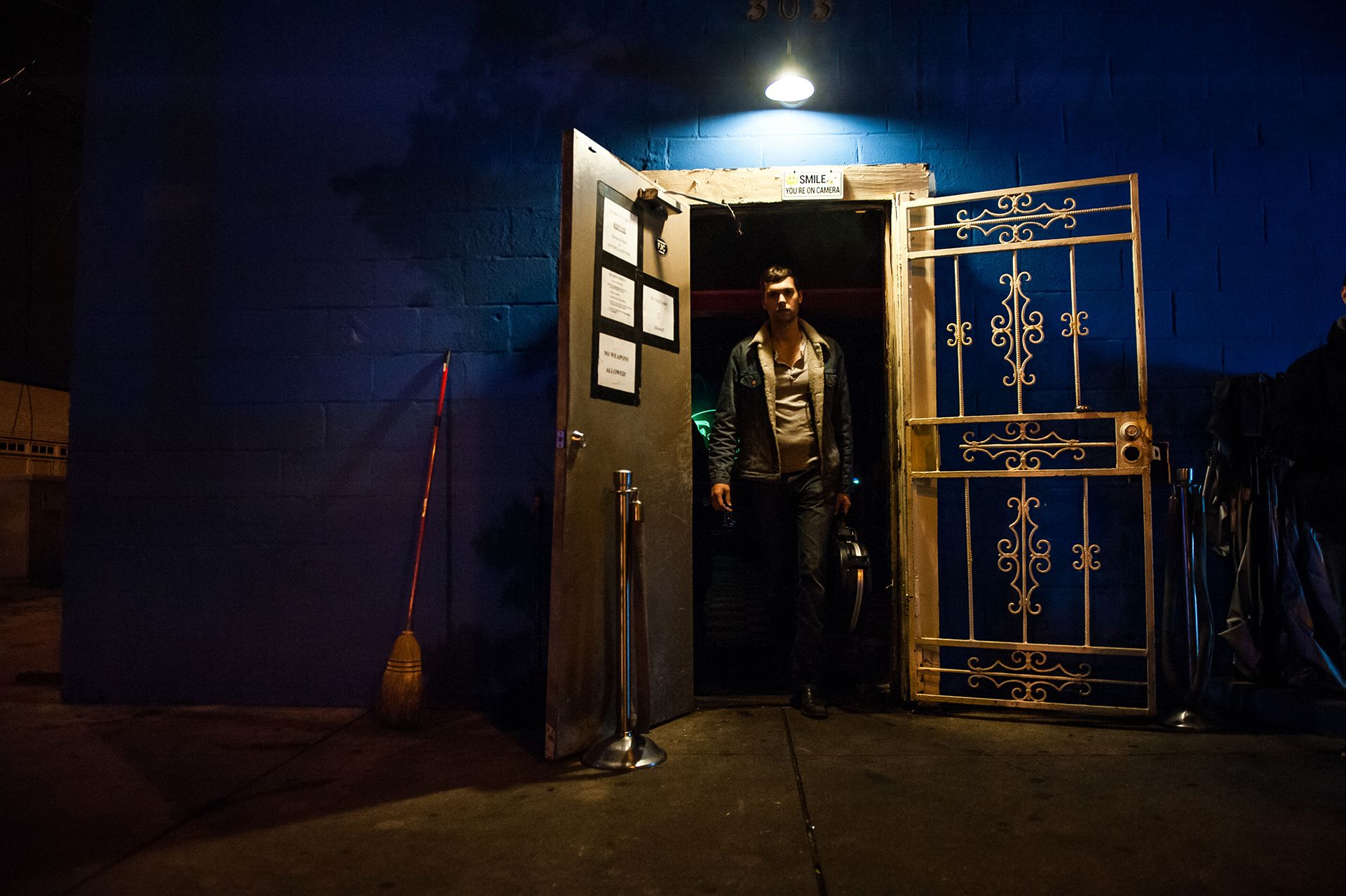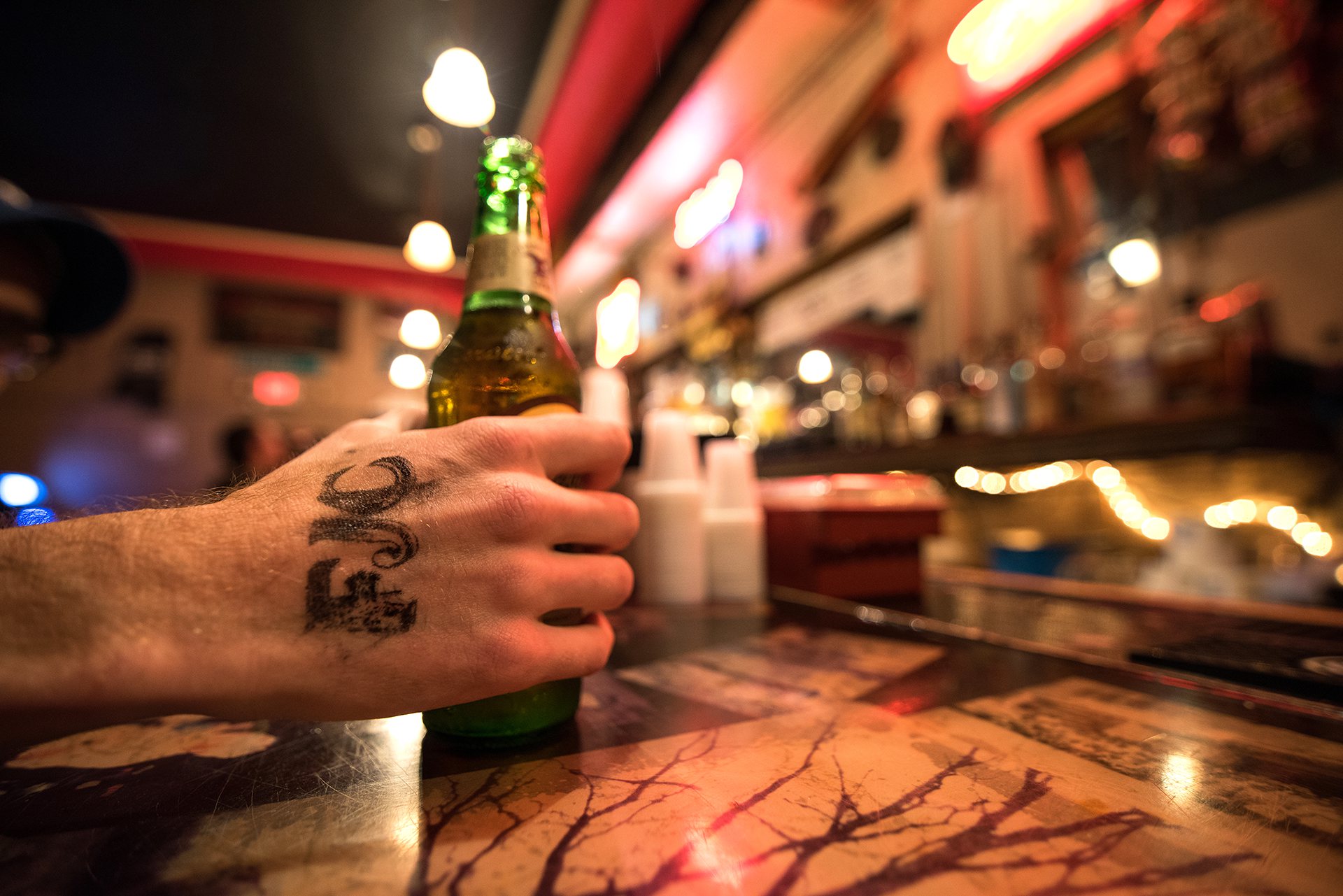In Jackson, Mississippi, Farish Street was once the “black Mecca” — the “largest economically independent African-American community in Mississippi,” according to the Southern Foodways Alliance. But after desegregation, the neighborhood crashed and burned. Now, though, deep in the night, the progressive holdouts of Mississippi’s capital — black and white, old and young — flock to Farish Street to down Jell-O shots and dance until the sun comes up. Welcome to Frank Jones Corner: You might call it the all-night juke joint that proves Mississippi is better than its ugly laws. But, like everything here, it’s complicated.
Story by Boyce Upholt | Photographs by Rory Doyle
At the southern foot of the historic district on Farish Street, every storefront is empty. Of some, only walls remain, framing overgrown lots of grass. Yet, oddly, the sidewalk bricks are neatly laid and swept.
Farther north, a few stores remain: a print shop, a cobbler. A bookstore has a Black Lives Matter sign propped in its barred window. Most buildings, though, are abandoned and boarded. Geno Lee, the owner of the Big Apple Inn — famous as the one surviving restaurant from this neighborhood’s peak — has to close some days when it rains.
“It rains in here, too,” he says.
Eight years ago, Daniel Dillon found a “For Sale” sign on Farish Street. The building was unlocked, so he peered inside: bare yellow concrete walls, a crumbling ceiling, an old theater curtain balled on the floor, recently used, it appeared, as a blanket.
This, Dillon thought, was perfect.
He spent the next four months doing his damnedest to get this space. Scrounging just enough cash. Sweet-talking the owner into renting, rather than selling at her exorbitant price. Sweet-talking friends to pitch in with loans, with labor — since, certainly, on Farish Street, no bank was going to get involved.
Building on a shoestring, Dillon created Frank Jones Corner: the only bar on a nearly empty street. Seven years ago, in the middle of Mississippi summer, it opened without an air conditioner, without a liquor license, selling only beer. It was — and is — a “late-night, juke-joint cesspool.” Those are Daniel Dillon’s words. Frank Jones Corner had a slow start. But one Saturday night that summer, people started arriving — so many people that Dillon couldn’t take their money fast enough. Word had spread, it seemed.
So, what is it about this bar?
“The decor is not great,” Dillon says. “The temperature is not that great. But it’s the Truth.”
Daniel Dillon likes to talk about the Truth — a word that clearly, to his thinking, deserves a capital T.
Here are some of Dillon’s Truths: real music, played late at night; the Subway Lounge, a new-defunct Jackson blues club that offered such music; a refusal to hire pricey interior decorators; the experience of being served by a bartender who has been slinging drinks for over 30 years. Dillon’s own father, a noted blues musician and former Green Party gubernatorial candidate, is the Truth, too.
“He’s a walking piece of Mississippi history,” the younger Dillon says. “I have a lot of good qualities, but I’m a derivative of this guy who’s the fucking Truth.”
Dillon likes to say that the Truth sets him free. I assume by this he means his willingness to say just what is on his mind — which, for the moment, is his fury at his governor. It’s a few hours before the bar opens on a day in late April, which Gov. Phil Bryant is calling, officially, Confederate Heritage Month.
“How can you fucking say that?” Dillon says, pausing in his search for a drill. The bar, as always, is in need of repairs. “I know you’re a fucking racist. Yeah, I know you’d rather have black people living in a shack behind your house and do all the work for you. But you don’t have to say it.”
Mississippi’s state politicians are often conservative, to say the least. Take House Bill 1523, a “religious freedom” law that allows business owners with religious convictions to, among other acts, turn away customers based on sexuality or gender. After a federal judge in late June issued an injunction to block the law's implementation, the state’s attorney general, a rare Democrat among the state's officials, declined to appeal. But Gov. Phil Bryant decided to retain private counsel, and appeal with private funding. Last week, at the famous Neshoba County Fair — where in 1980 Ronald Reagan gave a controversial “states' rights” speech — Lt. Gov. Tate Reeves called the bill a part of a “pro-Mississippi, pro-family agenda.”
From just outside Dillon’s bar, and from almost anywhere on the blasted blocks of Farish Street, there is a clear view up to the state capitol. At night it’s unmissable, its dome lit by spotlights while the Confederate stars-and-bars ripples in the wind. In this political season — either a last-ditch fight for grand old American order, or a new resurgence of longstanding hate, depending where you sit — that flag marks Mississippi as a hotbed of our national tensions.
But Jackson, at least beyond the influence of the capitol, is a progressive outpost. The city government refuses to fly the state flag; the city council voted unanimously to condemn HB1523. Artists and entrepreneurs flock to neighborhoods like Fondren, where the streets are closed one night a month for a raucous block party.
Even in Jackson, though, spaces seem by unspoken consensus to be designated either white or black: white restaurants and black restaurants, white churches and black churches, and so on. (For many in the suburbs, the entire city is seen as a black space.) Some analysts believe that in 12 years Mississippi’s presidential vote will flip, as aging Republicans are replaced by diverse young voters. Though often that prediction is accompanied by a caveat: The state’s progressive politics must become more inclusive. Even within Democratic political circles, there are separate white and black social groups.
Which makes the crowd at Frank Jones Corner a point of pride for its employees. Later that evening, Justin Sebren leans across the bar and shouts so that he can be heard over the blast of Michael Jackson: “I’ve bar tended at a shit-ton of bars in this town,” he says, “and this is the most diverse bar around.”
A quick census: In the corner is Michelle, a black woman, not quite middle-aged, who has brought her visiting girlfriends — because, she says, F. Jones has good drinks, good food and good music, all of it cheap. She’ll be leaving soon, because in the morning she’s got to lead a fleet of black women on a run with GirlTrek. (Her friends decide to stick around.) At the bar is Kyle, a white man a few years out of college, in town from Memphis. Last time he came to Jackson, he says, this was the only bar that stuck distinctly in his mind. Ty, his host, claims 200 years of genealogically verifiable Mississippi heritage.
“And I don’t believe in all that stuff,” he says. “I believe in rights, gay rights.”
And there, further down the bar, is the middle-aged black man who refuses to give his name. He just says that he’s been to 48 states, speaks four languages, and there’s no place he’d rather be than this bar.
“Mississippi is not a state,” he says. “It’s a club.”
All this, and it’s early yet, not even midnight. Everyone always says that it’s late night — or early morning — when Frank Jones Corner is at its best.
That, for me, is daunting. I am a creature of discipline and routine. My alarm each weekday is set for 6 a.m. But in this month, in this state, this is the bar I need.
I’ll tell you up front I’ve got an ulterior motive. After seven years here, I consider myself a Mississippian. I’ve gotten tired of the questions from friends back in New England, wondering if I’m going to stay another year. I’m miffed at the boycotts and the concert cancellations. There’s more to Mississippi, after all, than our hateful laws, and the way to change them is not to avoid the place; it’s to pack the state with people who will fight for change.
I want to show you a little bit of Mississippi’s appeal. So, discipline and routine be damned, I’m going to be up all night at Frank Jones Corner.
When I arrive at the bar, soon after opening hour — 10 p.m. — Bernard Lucas greets me with a grin, carrying a bucket slopping with green-tinged water.
“We’re going to make it smell nice,” he says. I’m far too early; there is not yet a patron in the place, and the bartenders are still setting the beer on ice.
Lucas, multiple people will tell me this evening, is a legend. Tall, skinny, his 56 years indicated just by the grey in his mustache, Lucas been working in the service industry for four decades. These days, he manages Frank Jones Corner on weekends, while all week he works at a law firm.
“I’m trying to get the bills paid,” he said. It’s a tough life; he regrets having to miss the birthday parties of his five grandkids.
Lucas said that as a child he would come here, to Farish Street, to visit his uncle. He’d buy ice cream, or catch a movie at the only theaters where he was allowed. As a black Jacksonian of his generation, Farish Street has always been a presence in his life.
Built during Reconstruction, Farish Street hit its peak in the middle of the 20th century. With candy shops and chicken shacks, law firms and doctor’s offices, it was the largest economically independent black community in the state. The neighborhood was self-sufficient, as it had to be; go two blocks north, or south, or east, and you hit the unwelcome boundary of white neighborhoods.
Archival photos provided by Charles C. Mosley, Jr. | Margaret Walker Center, Jackson State University
The Black and Tan Republicans met here; later, civil rights martyr Medgar Evers worked out of a Farish Street office. It was also a place of entertainment, of blues and jazz and ice-cold beer. Trumpet Records, the first label in Mississippi to reach national prominence, was based out of a retail store in the building next to Frank Jones Corner. H.C. Speir, the talent broker who introduced the legendary Delta blues man Robert Johnson to national recording outfits, recorded demos on this street.
Many blame the Civil Rights Act of 1964 for the neighborhood’s decline. Suddenly, black shoppers had more choices about where to spend their dollars. White shoppers, meanwhile, weren’t about to patronize black-owned stores.
“Integration was a great thing for black people,” Geno Lee, the owner of the Big Apple Inn, told me. “But it was not a great thing for black business.” In the 1970s, store by store, Farish Street began to shut down. Jackson at large, changed, too. Dillon, in grade school in the 1980s, watched as white families packed up and moved out to the suburbs — taking their money with them. Bernard Lucas, for his part, lays plenty of blame on the government’s ineptitude, too.
“If you find a street in Jackson without potholes, it was probably just paved,” he says. “Every year, they under-fund education. And they want to know why people move? They’re moving because you’ve got nothing to offer them.” With that, he slips back into the kitchen. He, for one, has work to do tonight.
Dillon’s first step, after he found the property, was to convince Adam Hayes — his best friend turned business partner (and now, incidentally, turned brother-in-law) — to move home from Germany (where Hayes managed a restaurant at an Air Force base) and to find $5,000 in cash to invest. In truth, he was suggesting that Hayes completely reinvent his life. The pair had met in culinary school, and had been bullshitting about opening a restaurant for years. Hayes was in.
They came up with a motto, still emblazoned on the back of the T-shirts their employees wear: “Revitalizing Jackson, one beer at a time.” Dillon sees that sentence as a subtle dig at the city, which for years has tried and failed to bring Farish Street back.
Such efforts began in 1979, when a 125-acre zone, containing nearly 700 buildings, was placed on the National Register of Historic Places. Five years later, a museum opened in what was the city’s first black school. But by 1992, when four different task forces had led rehabilitation efforts, spending $2 million, they had little more to show.
Dillon, who grew up nearby, remembers coming in this era to hang at Fields Cafe, an earlier venue in the building that now houses FJC. The only reason Hayes knew about the street was the blue-plate lunches he sometimes ate with his father at the legendary (and now closed) Peaches Cafe.
In the early 2000s, a new plan was proposed: Make Farish Street into Jackson’s version of Bourbon or Beale. The city went as far as to sign, in 2002, a 45-year lease with the same firm that oversaw the redevelopment of Memphis’ Beale Street. The sidewalks were widened and laid with new brick, which accounts for the strange cleanliness of the abandoned blocks surrounding the bar. But sewage seeping from unmaintained pipes proved too costly to fix, at least amid the swirl of conflict and mismanagement surrounding the project.
In 2008, the same year Dillon and Hayes first noted the empty property, a local developer named David Watkins took over the lease from the development firm. His efforts were a blessing and a curse: Dillon and Hayes, who bought the building in 2010, found themselves the only private owners of real estate in the future entertainment zone. But for a two-year period, cars were forbidden from driving on this stretch of Farish, so their patrons would have to park blocks away and walk.
Dillon recalls Watkins showing up, talking about his plan to turn the district into “a Mercedes,” while comparing FJC to a “good-running Chevrolet.” But — as Dillon points out — an old Chevy is a lot more Farish Street than some glitzy Mercedes. An old Chevy, one guesses, is closer to the Truth.
Watkins encountered his own obstacles, anyway, including prohibitively expensive repairs required on a building intended to be one of the complex’s marquee clubs. When the mayor canceled Watkins’s lease in 2013, reverting control to the Jackson Redevelopment Authority, Watkins placed liens on his former property. In response, the JRA sued. Two judges have recused themselves in the ensuing court battles, which continue still. The current mayor seems uninterested in these battles; he’s called Farish Street an albatross. Which, not surprisingly, sets Daniel Dillon off.
“An inanimate object can't be the cause of your problems,” he says. “It's mismanagement that causes the problems. The real albatross is the Jackson government, if we want to call an apple an apple.”
Near midnight, just before the band kicks off, Dillon is standing in front of his bar. A group of young men in suits stumbles past, wandering in from a wedding at a hotel downtown.
“Is this the place?” one of them says.
“This is the place,” Dillon replies.
But someone in the party says no — they’re aiming for another new bar, two blocks further up. When Dillon suggests they get their hands stamped now — it’s only a dollar cover before midnight, compared to ten after, and they’ll be back — they brush it off as salesmanship and walk away. Following in their wake is a young woman.
“Hey, guys,” she says, “This is the place we’re coming to later!” But they’re too far up the street now to hear.
They do show up later, perhaps because F. Jones Corner is one of the few bars in town still open after 2 a.m. This is a model Dillon saw work well for the Subway Lounge, the legendary blues and jazz club housed in the basement of the city’s first black-owned hotel. (The hotel and lounge both were demolished in 2004. “Our governing body has a way of eliminating points of interest that don't represent the grand old Dixie south,” Dillon says.) The Subway wasn’t a bar, technically; they just charged a cover and for liquor set-ups and beer, so they could stay open even after the legal cut-off for last call. Visitors would sometimes head to the house next door, where the owner sold hot dogs from her stove and beer out of her refrigerator. The Subway Lounge, too, was a kind of integrated space, as juke joints in the second half of the 20th century often were: White musicians played in the bands; patrons both white and black showed up to hear what Dillon calls “real” music.
Frank Jones Corner, everyone says, is an “industry” bar — where waitresses and bartenders come in their off-hours to hang, bringing with them the savvy diners who asked for their advice. Almost every out-of-towner I met that night had arrived at FJC at the behest of their server at dinner.
Dillon likes it this way. He said the one time he tried to market the bar to a general audience is the one time he started to have troublesome crowds.
Just after 2 a.m., the rush comes: In clusters, some black and some white, they greet the doorman by name. The band, the Bailey Brothers, is two hours deep now, starting to fall into their groove. Dancers bob, a little drunk already, and sing along to a setlist of classic rock and blues. Beers are flowing — PBR and Corona and Budweiser, nothing fancier than a Yeungling. Kyree Green, the bar’s young black cook, who moved to Mississippi from North Carolina after meeting Dillon’s brother there and proving himself worthy of the job, weaves between dancers, bearing chili dogs and hamburgers and deep-fried grits. All good Southern food, made far more carefully than any 3 a.m. hungry and drunken reveler may ever notice. FJC’s burger is one of the finest in Jackson.
This late-night party is made possible by the same attempts to revive Farish Street that Dillon mocks. Just before they moved into the property, the surrounding blocks were granted resort status, which freed FJC from the restrictions faced by other Mississippi bars: They needn’t worry about ensuring that at least a quarter of their revenue comes from food — and they don’t need to stop pouring liquor come 2 a.m.
A few other bars in Jackson have petitioned, successfully, for that status, which worried Dillon at first. Though by the time I met with him, beyond his notice, his competitors’ late night hours had gone into effect. That he hadn’t even noticed attested to the reason he was able to put his worries out of mind: His bar has something special. It offers the Truth.
Here, though, is one more piece of truth: Adam Hayes and Daniel Dillon are white.
That’s a fact I learned only after I had proposed this story — after I decided I wanted to celebrate this bar.
There’s a phrase painted on a wall inside, another motto for the bar: “No black. No white. Just the blues.” Some progressive Mississippians, people thoughtful about race and justice, have told me when I mentioned the bar that they are made uncomfortable by that phrase. It could be seen, they say, as erasing black identity — especially here, on a street with a deep history of black pride.
This rattled me. To be honest, it made me doubt my entire thesis: What does it say that it’s only deep into the night, guzzling cheap beers in the illicit glowing neon of a juke joint, when we can muster the courage to come together, black and white?
It’s no big news that, despite more than 50 years since the passage of the Civil Rights Act, black Mississippians — and black Americans generally — face, on average, quite different economic outcomes than their white peers. Though 79 percent of Jackson’s residents are African-American, only a quarter of its businesses are black-owned (although that does make it one of the top 10 American cities for black entrepreneurs, according to one report).
“A big part of it is segregation of capital,” Maati Jone Primm tells me. “Integration did not mean access to capital.” Primm is the third-generation owner of Marshall's Music and Bookstore, which has existed on Farish Street for more than 50 years. Inside, above neat stacks of Christian texts, hang pictures of black heroes and martyrs.
Primm has had friends try to open businesses in Fondren, the up-and-coming progressive neighborhood nearby. She says one had trouble acquiring property; another had to shut down her store because the locals, mostly white, declined to shop there.
“Farish Street is really our only option,” she says. “We still can’t go anywhere and everywhere.” She does not believe every business owner here must be black; but she does think that its business owners and residents should advocate for racial justice.
Dillon says he questions himself, too. “Why am I the right person to be doing this? How am I not this usurper?” But he is indigenous, he says. “This” — he gestures around his bar, and toward the neighborhood outside — “is my natural habitat.”
The motto painted on the wall is something he borrowed from Fields Cafe, the venue that used to be in the same space. It hung there, cross-stitched into a framed piece of fabric. Dillon noticed it when he came, as a young white man, to drink in this black neighborhood.
While other white families fled his west Jackson neighborhood, Dillon’s stuck around. By middle school he found he was the only white student in his grade. He remembers struggling with this fact; he, too, is familiar with what it’s like to be excluded.
“I used to think, ‘Damn this shit, why am I over here in the ghetto, man? I don’t know none of these people. I hate black people.’ I got to the point where I was really racist ...," he says. Dillon calls that period of his life "one of many regrets." No particular event brought around his change in attitude. Instead, it was simpler, his own growing realization about the stupidity of holding such views, particularly in the community where he lived. He says he recalls saying to himself, "This is not gonna pan out, dude. You live in West Jackson."
Dillon’s father has always played in integrated blues bands, at the Subway Lounge, in now-defunct Farish Street clubs and even now at Frank Jones Corner. His younger brother plays in the band at the Farish Street Baptist Church. Dillon knows the street’s history, and wants it celebrated. He believes we need to acknowledge the oppression and injustices in our past. But he does not think we should be bound by color. He has siblings who have married black partners; when I ask if he’s comfortable labeling their children as black or white, he says he’s comfortable calling them “beautiful babies.”
Dillon, despite his outspokenness, does not see his bar as a project of activism. “I’m not carrying a torch,” he says. “Or whatever torch I’m carrying, I’ve got my hand out for money at the same time.” He and Hayes were happy to secure a surprising side venture last year: Frank Jones LLC manages the cafe tucked into the stables beneath the state capitol. During legislative sessions, while Dillon manages day-to-day operations at the bar, Hayes makes breakfast and lunch for the legislators and their staff. He can’t stand for the new laws, but he can get along with anybody, he says. “Whatever they do over there, they can do over there. I can still be their friend when they come in here. It’s the business I’m in: customer service. I don’t have to like the person, but I will take their money.”
The pair have plans to develop a restaurant in the space next door to the bar, one with a more family-friendly atmosphere.
“I consider myself to be part of the fight,” Dillon says. “I have a real clear goal: My goal is making people interact with one another on a positive level on Farish Street. This is something we have to resolve. It’s affecting our whole state’s economy — our inability to deal with the past, our inability to reach across the white and black lines.”
None of this can be untangled without deciding what you want Farish Street to be — without developing a larger vision about how this city, and the nation more generally, should move forward from its troubled past.
Is progress all about revving up an economic engine, building a booming entertainment district that will draw more visitors and dollars downtown? Everyone I spoke to said that dream is impossible without mixed ownership of businesses, black and white — because it requires that both black and white patrons come to spend their dollars.
But Primm and other longtime residents of the neighborhood I spoke with have a different vision: They want Farish to return to its history as a mixed-use, mixed-income neighborhood, a high-traffic street, with, yes, many black-owned businesses. She seeks not an economic windfall — just a healthy, sustainable community where local money is spent in local stores. If the black dollars pouring into Wal-Mart and other superstores stayed local, she says, there would be plenty of money for this neighborhood to thrive. To overcome historic injustice, in other words, requires economic justice, too. A different form of capitalism.
These are important questions. But I will admit that come 3 a.m., while a black woman backed by a white band is stomping through the Delta blues on stage, it was not a question on my mind. I was just watching the celebration: a trio of young men, barely old enough to drink, two black and one white, clasped in a swaying, late-night, group hug.
Finally, a little past 4 a.m., the band wraps up.
“Be sure to tip your bartenders generously,” a band member shouts. “Be safe on the drive home. Thank you, F. Jones!” He pauses for a moment, and then clarifies: “Pay your tab and get the fuck up out of here.”
So, I do.
Outside, there is a light mist in the air, and morning bird calls sound from nests built into the caved-in roofs. I look east, but there’s no sunrise, not for another two hours. Just the spotlights on the dome of the capitol.
There’s a lot to fix still here in Mississippi, and I can’t say what it means that we seem to come together only for these fleeting hours past midnight, in this cesspool juke joint of a bar. But as I walk to my car, I’m sure glad we do.
Farish Street, I’ve been told, has always contained multitudes: There were places to pray, places to work, places to drink and dance away the pain. We still need prayer and work, and I hope we can do it together. But dancing together — that, for now, is something, too.
~~~
Writer Boyce Upholt and photographer Rory Doyle live and work in Cleveland, Mississippi.
~~~
For a deeper look into the history of Farish Street, The Bitter Southerner highly recommends "The Farish Street Project," from the Southern Foodways Alliance and the Southern Documentary Project at the University of Mississippi.










